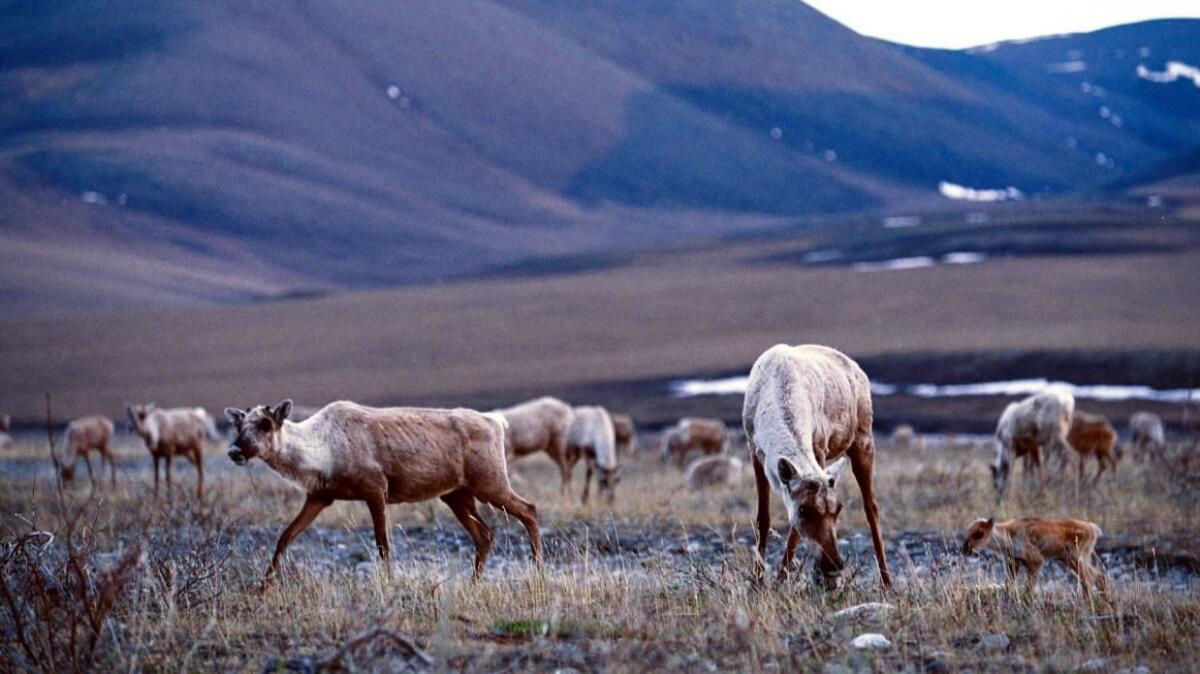Editorial: Drilling in the Arctic refuge to give tax cuts to the rich is dangerously stupid

- Share via
The Republican tax bill that President Trump signed into law last week contains enough noxious items to attract the scrutiny of the Environmental Protection Agency (if it still investigated toxic things). Experts are still working to understand all the repercussions, because the GOP rushed it through without hearings or in-depth analysis.
But one target is clear. After four decades of effort, Republicans finally have managed to crack the legislative wall barring oil drilling in a section of the Arctic National Wildlife Refuge, a pristine region of stunning beauty in northern Alaska that is home to caribou, polar bears, grizzlies and more than 200 other species.
In a cynical budgetary sleight of hand, the Republicans slipped the ANWR provision into the bill by asserting that the oil lease revenues it would generate would help pay for the massive cuts going to corporations and the wealthy.
Market forces, environmental laws and the courts could still save the Arctic National Wildlife Refuge from drilling.
But with luck and a continued market move away from fossil fuels, the refuge might escape the fate that President Trump, Sen. Lisa Murkowski (R-Alaska), Rep. Don Young (R-Alaska) and the oil lobby’s other friends in high places have in mind for it.
The federal government first designated part of the territory for protection in 1960, less than two years after Alaska joined the union, and then expanded it to 19 million acres in 1980. It was left to Congress to decide whether drilling should be allowed in the so-called 1002 area, which covers 1.5 million acres of coastal plain beginning 50 miles east of Prudhoe Bay, a hub of existing arctic oil operations that feed the Trans-Alaska Pipeline from the Arctic to Valdez, on Prince William Sound. (The 1980 law allowed one test well in ANWR, and 30 years after it shut down, the landscape remains scarred despite remedial efforts; the test results remain under wraps.)
For decades, environmentalists have successfully fought off any further drilling, but pro-oil politicians, citing a Congressional Budget Office estimate that leases could generate $1.1 billion in federal revenues over 10 years, added the drilling provision to the tax measure, in effect sacrificing the fragile environment on the altar of its tax giveaway. And it may be a fake revenue prediction — some critics argue that drilling in the 1002 area could generate as little as $37.5 million in federal revenues over 10 years.
Expanding drilling in ANWR poses a significant risk of environmental disaster. A large oil spill in such a remote wilderness that is so difficult to reach could have devastating effects on the plants and many animal species that live in the area or migrate through it.
The good news is that market forces, environmental laws and the courts could still save the refuge from drilling. The tax bill requires Congress to hold two oil lease sales in the next eight years, but holding a sale isn’t the same thing as actually selling the leases. With fracking helping fuel an oil glut, oil prices remain relatively low, and the costs and risks of drilling in the region are high — especially since there is no pipeline or transportation infrastructure in the 1002 area. In fact, major oil producers weren’t exactly clamoring to open the region to drilling. Alaskan politicians and small local producers seeking new oil revenues, not market demand, propelled this move. And to proceed, proposals must pass extensive environmental vetting, setting the stage for years of legal challenges that will add to the cost for those who would drill. Were Republicans to lose control of Congress or the White House, that could also upend these short-sighted dreams of Arctic refuge oil.
Environmental groups need no prodding from us, but we hope they do what they can to challenge whatever proposals might arise. We hope also that the political climate in Washington changes and that full protections — such as designating ANWR a national park, which could preclude drilling — are extended to the region. Drilling in ANWR poses a risk of regionalized ecological catastrophe — oil spills are hard enough to clean up without adding the overlay of sub-zero temperatures and months of limited daylight.
As the world rightly tries to throttle back the production and burning of fossil fuels, it’s ludicrous to go to such extremes to expand supply. The billions it would cost to find and extricate oil from such a remote location would be better spent investing in wind, solar and other renewable sources. The future habitability of Earth hangs in the balance.
Follow the Opinion section on Twitter @latimesopinion or Facebook.
More to Read
A cure for the common opinion
Get thought-provoking perspectives with our weekly newsletter.
You may occasionally receive promotional content from the Los Angeles Times.









